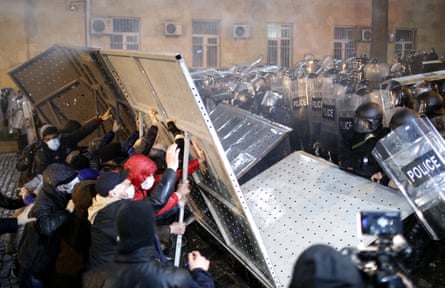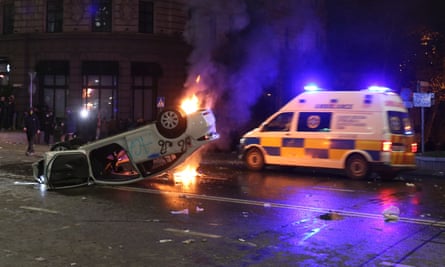Volodymyr Zelenskiy has called for “democratic success” in Georgia, as thousands of protesters rallied against legislation that could undercut Tbilisi’s efforts to join the EU, and which critics have compared to a law in Russia that has been used to stifle dissent.
“There is no Ukrainian who would not wish success to our friendly Georgia. Democratic success. European success,” the Ukrainian president said in a Wednesday evening address. “We want to be in the European Union and we will be there. We want Georgia to be in the European Union, and I am sure it will be there. We want Moldova to be in the European Union, and I am sure it will be there. All free nations of Europe deserve this.”
On Wednesday, hundreds of police, many carrying riot shields, used water cannon and teargas in clashes with protesters during a second night of unrest in Georgia’s capital. More than 60 protesters were arrested outside parliament in Tbilisi.

Earlier, thousands had marched in the streets to rally against a proposed law that would require any organisations receiving more than 20% of their funding from overseas to register as “foreign agents” or face substantial fines. The legislation is backed by the ruling Georgian Dream party. A comparable 2012 law in Russia has been used to suppress western-funded NGOs and media.
Protesters carrying Georgian, EU and Ukrainian flags gathered outside the parliament building and shouted: “No to the Russian law.” Demonstrators also blocked the city’s central Rustaveli Avenue, after a call from the main opposition party, the United National Movement, to gather there.
Anti-Russian feeling is common in Georgia – once part of the Soviet Union – due to longstanding Russian support for two separatist regions and a brief Russian invasion of the country in 2008. Many Georgians back Ukraine and the latest polls show 85% of Georgians support EU membership.
The draft law “goes directly against the Georgian authorities’ declared ambition to receive candidate status for EU membership,” read a statement from European parliament members Maria Kaljurand and Sven Mikser, who are senior figures in relations with Georgia.
“The new law’s purpose, under the guise of promoting transparency, is to stigmatise the work of civil society organisations and media,” the statement added.

In his Wednesday address, Zelenskiy voiced gratitude for Georgian support for Ukraine. “I want to thank everyone who has been holding Ukrainian flags in the squares and streets of Georgia these days. I want to express gratitude for our national anthem that was played in Tbilisi. This is respect for Ukraine and I want to express my sincere respect for Georgia.”
One critic in Georgia, Vakhtang Berikashvili, said many of his friends had already left the country because they did not like what the government was doing.
“This is what happened in Russia, what started in 2012 and what is continuing until now … this draft law, which is even worse than the Russian law,” he said.
“If they beat us, the only choice we would be left with would be to leave the country or die without saying anything. We don’t want this future. This already happened in Russia and we don’t want this to happen in Georgia.”
In Washington, state department spokesperson Ned Price voiced solidarity with the protesters. “We urge the government of Georgia to respect the freedom of peaceful assembly and peaceful protests,” Price said. “We are standing with the people of Georgia and the aspirations that they have.”
Georgia’s president, Salome Zourabichvili, said on Tuesday evening that she intended to veto the law if it crossed her desk. However, the parliament can override her veto.
Protest leaders on Wednesday called for demonstrators to prevent parliament members from returning to the building until the measure is withdrawn.
It was set to be discussed on Thursday, but local media reported that the debate had been suspended. Speaker Shalva Papuashvili on Wednesday asked for the measure to be assessed by the Vienna Commission on constitutional law of the Council of Europe, the continent’s leading human rights body.

 1 year ago
69
1 year ago
69










 English (US)
English (US)